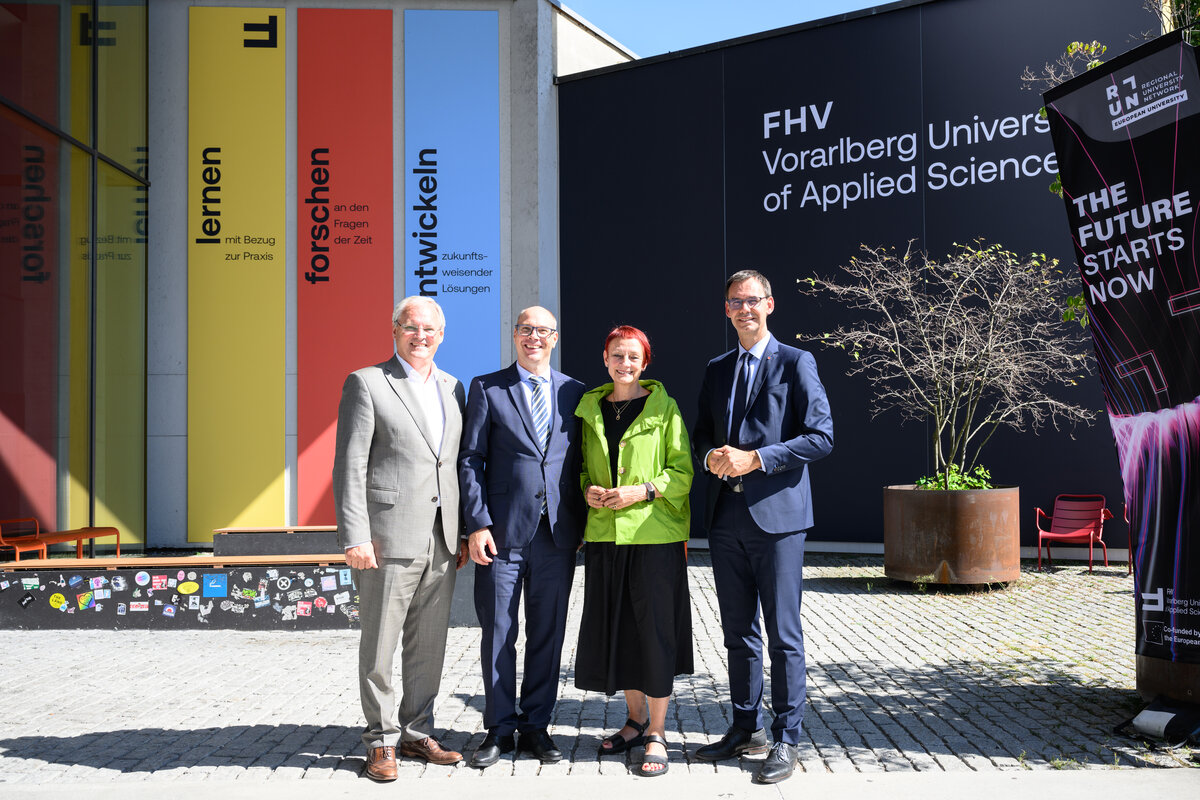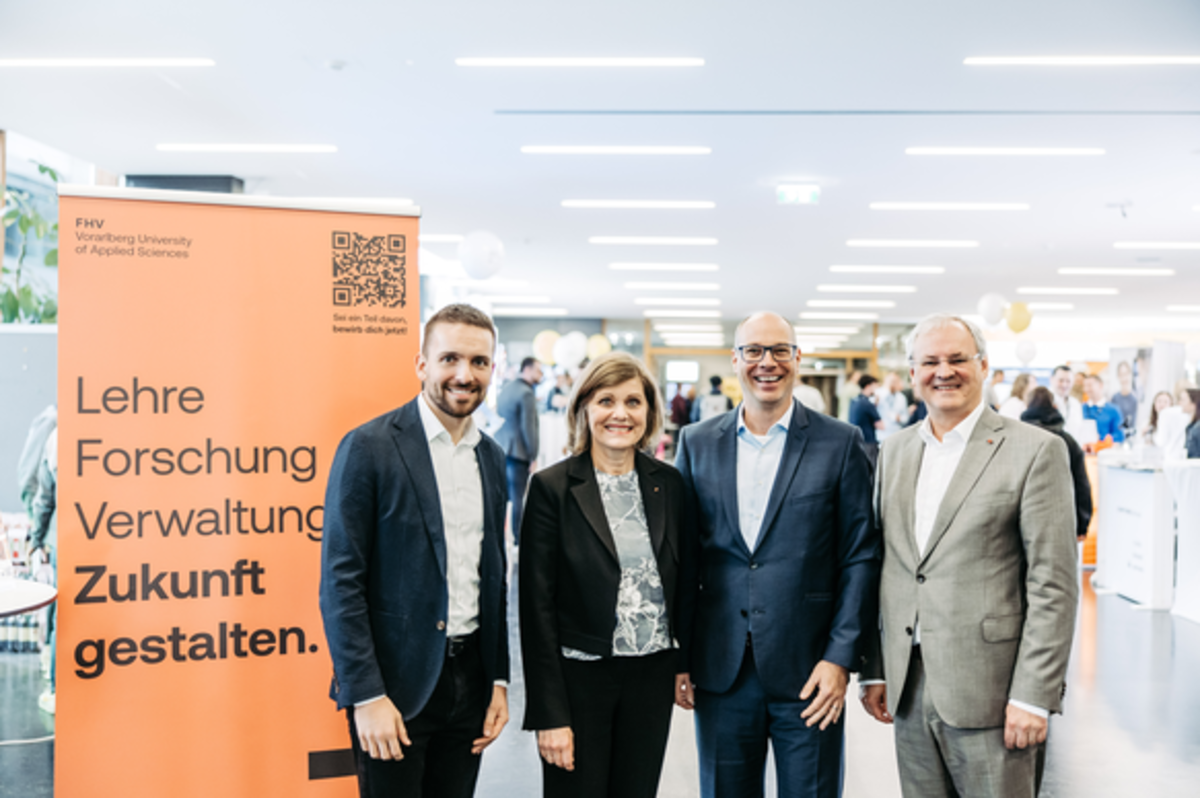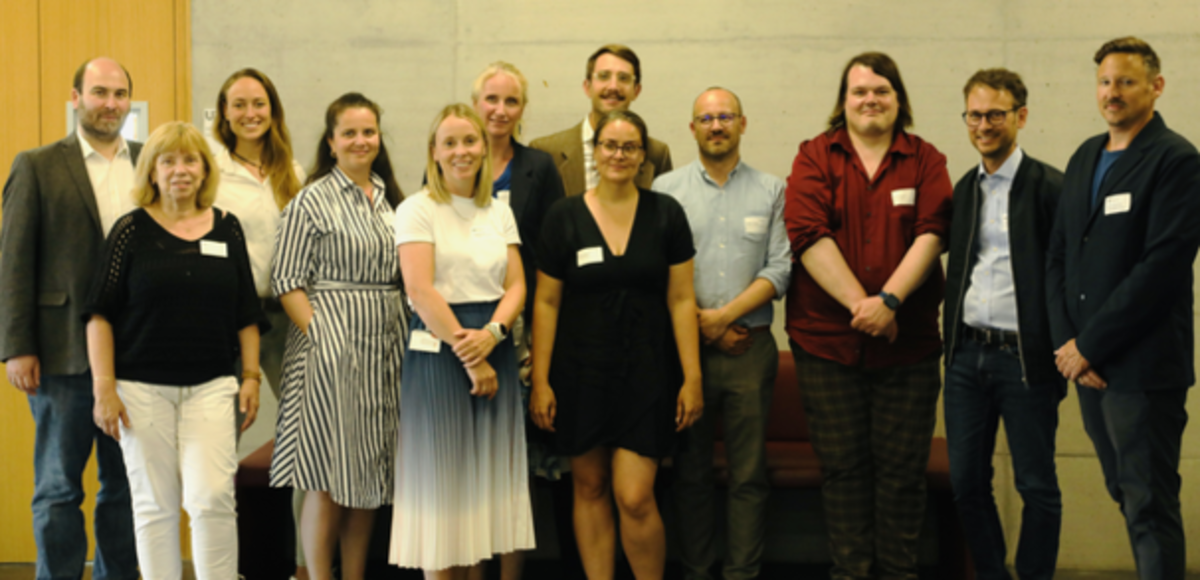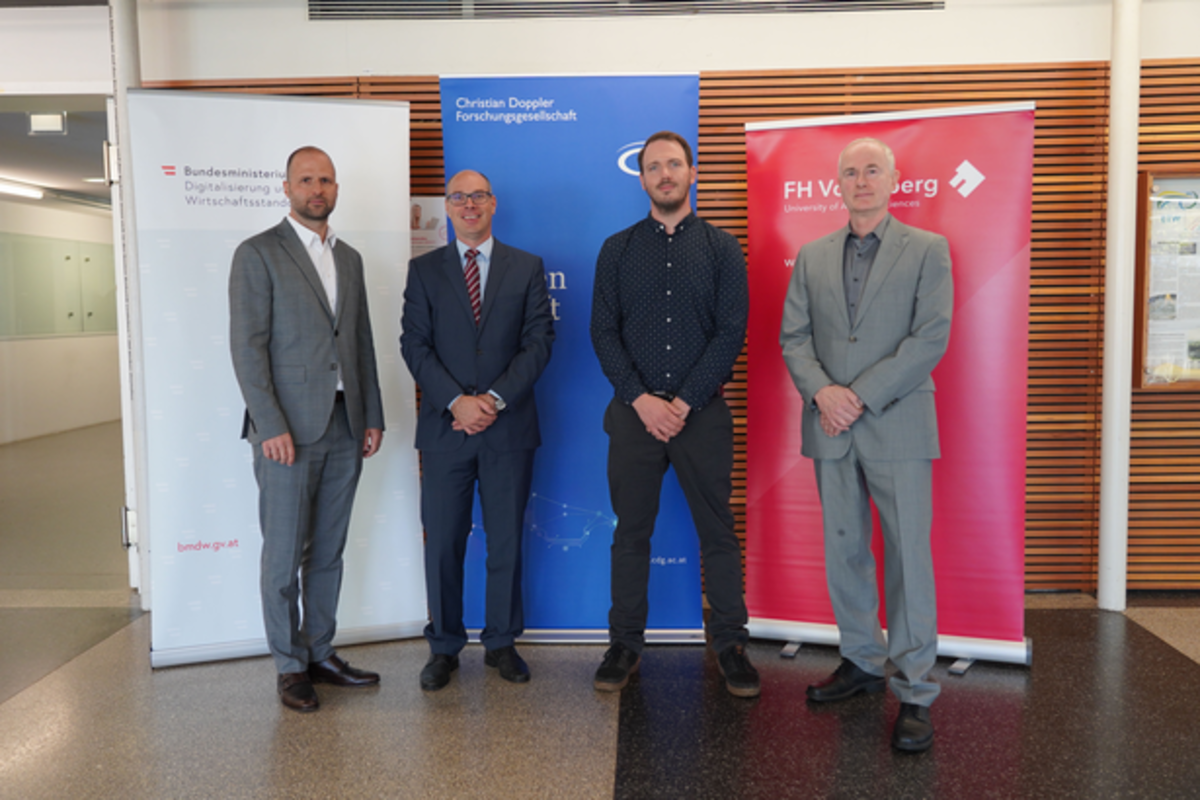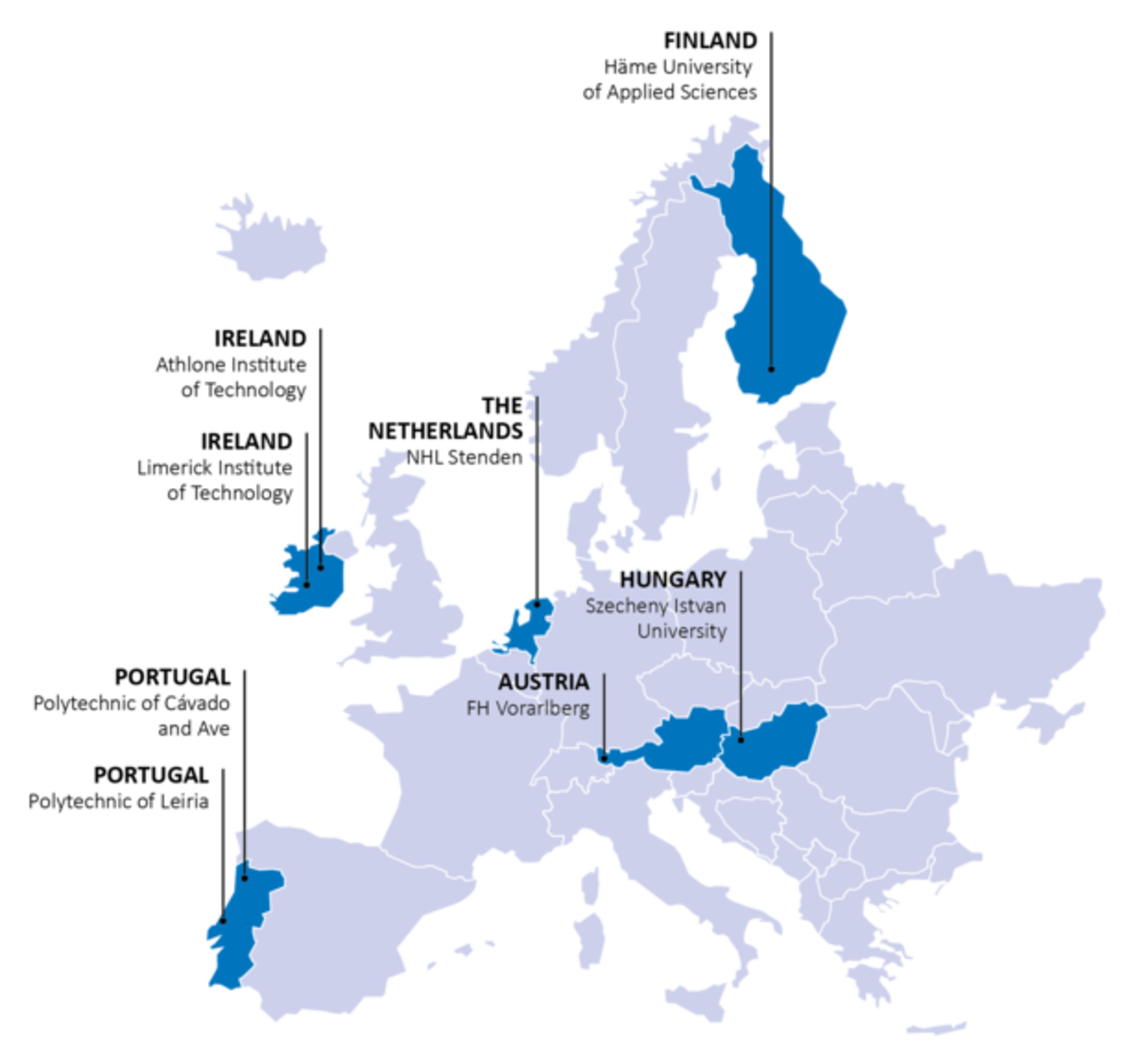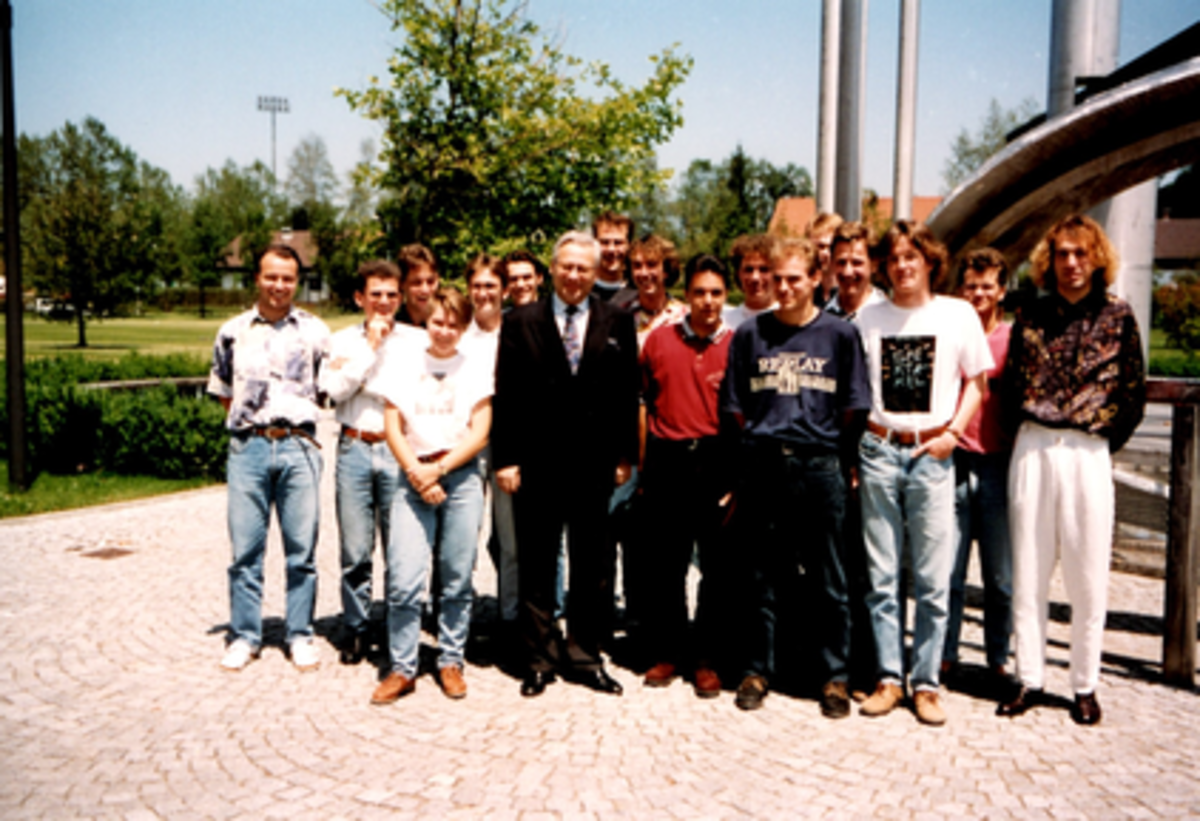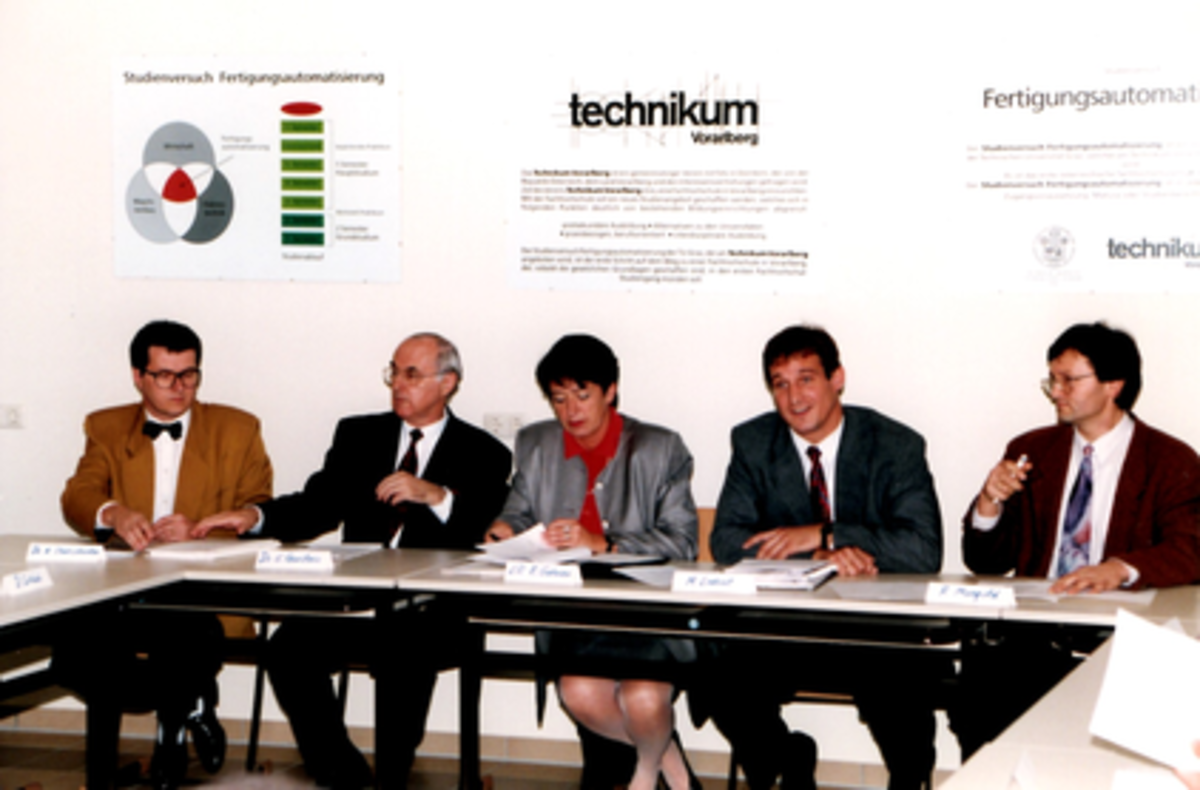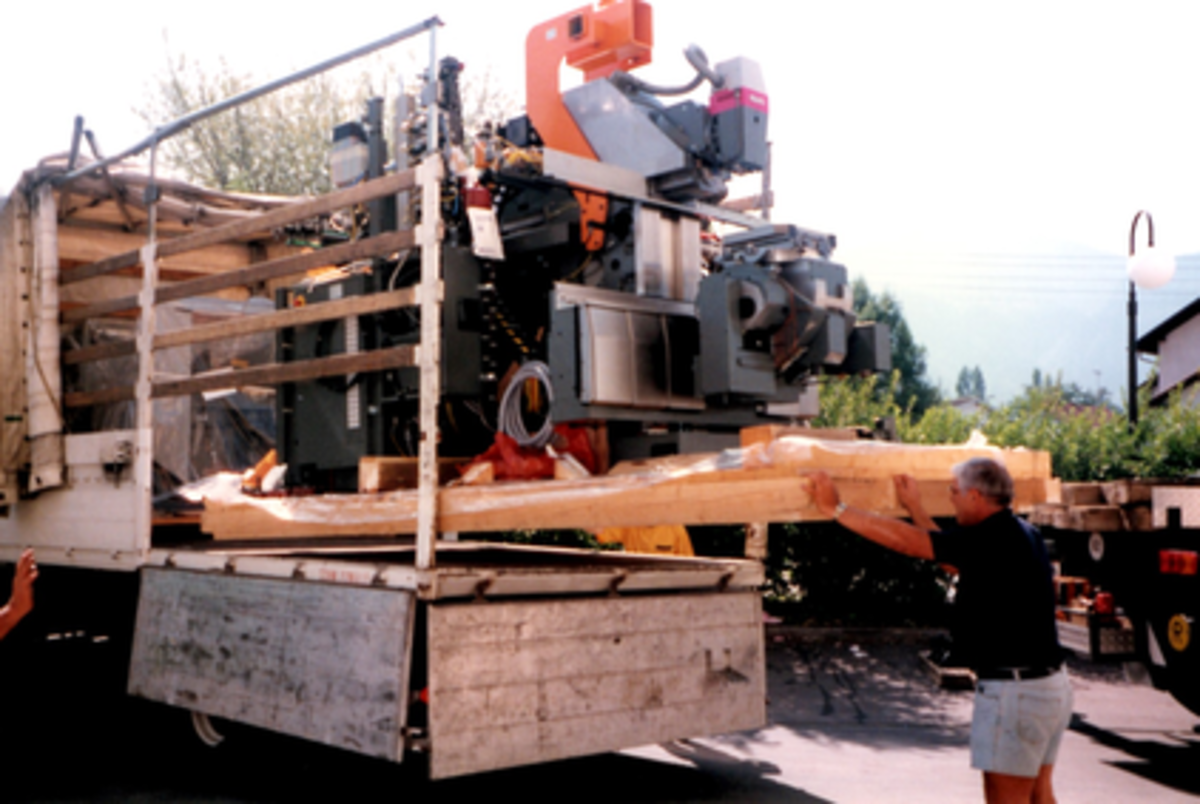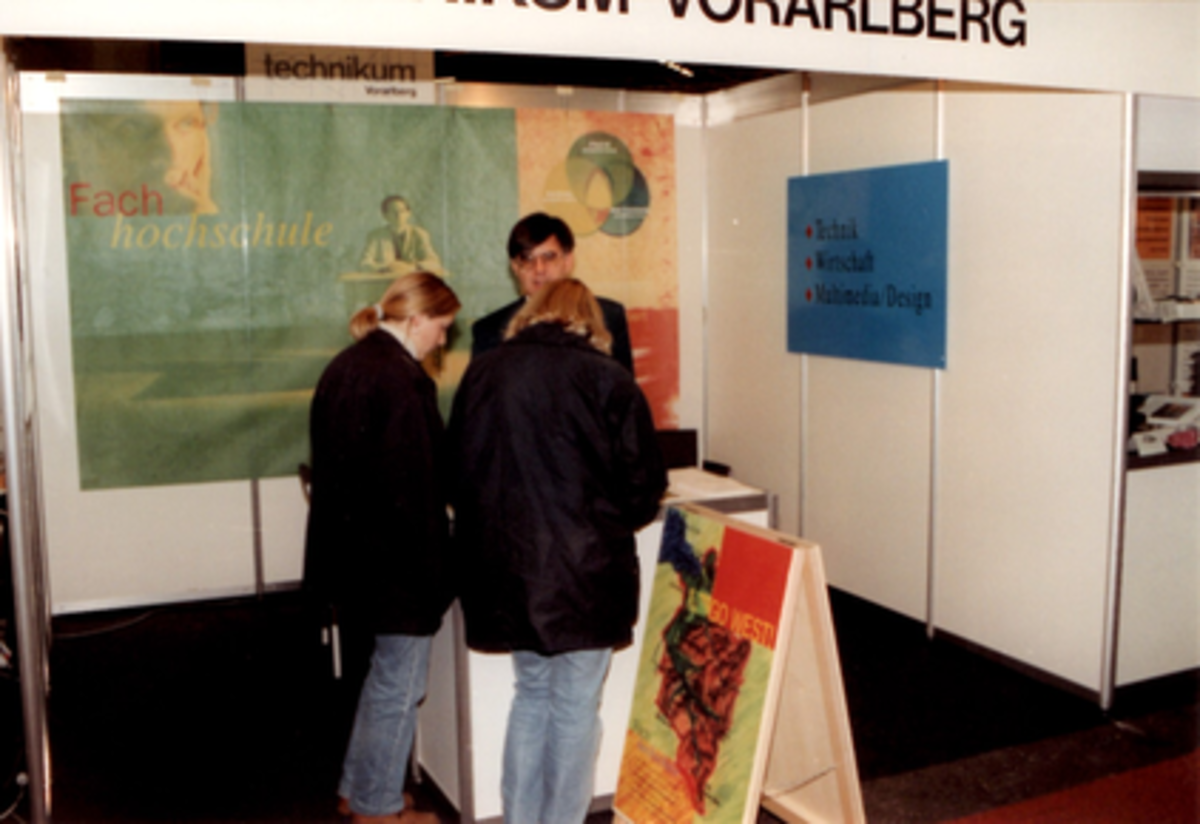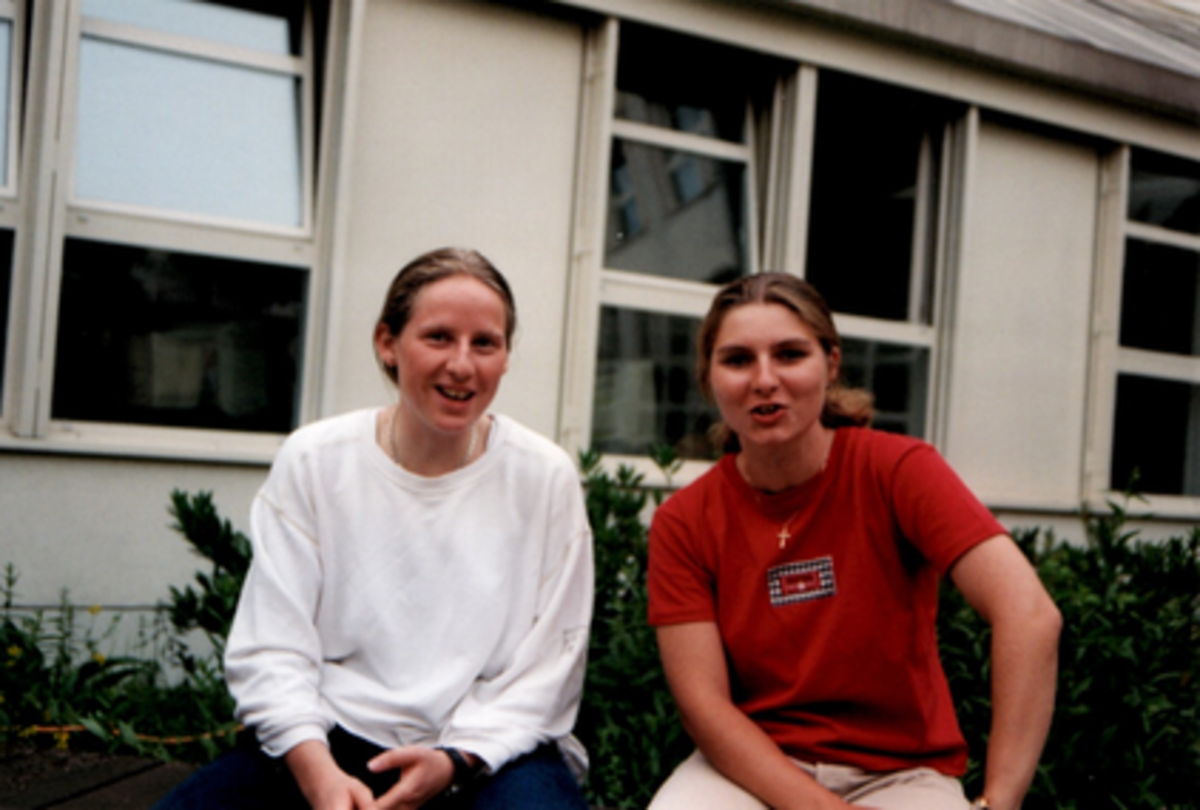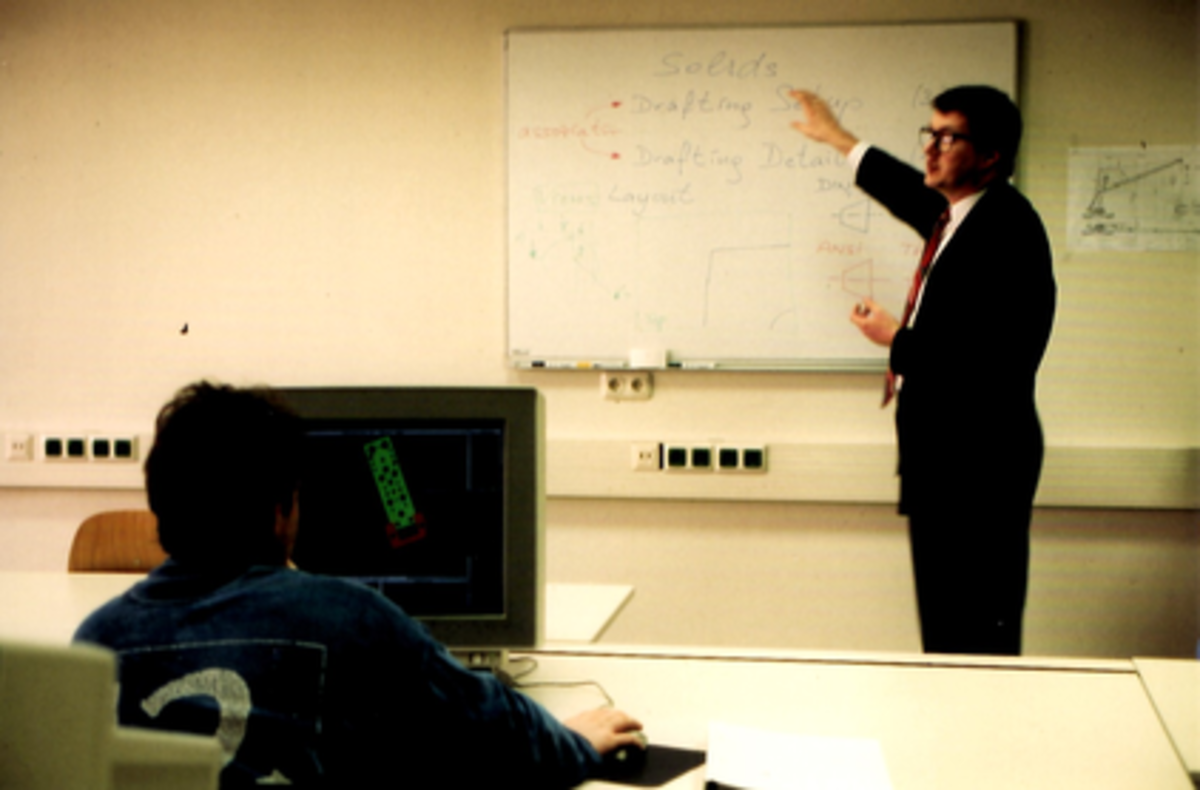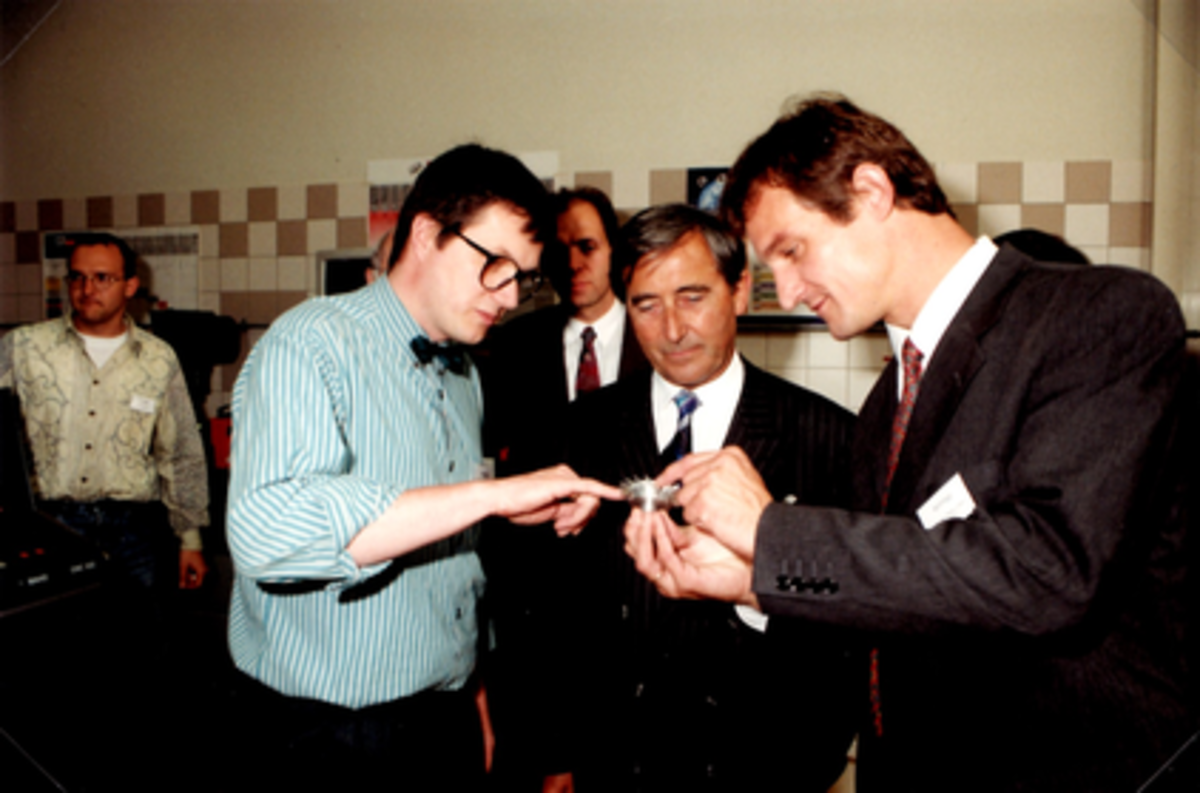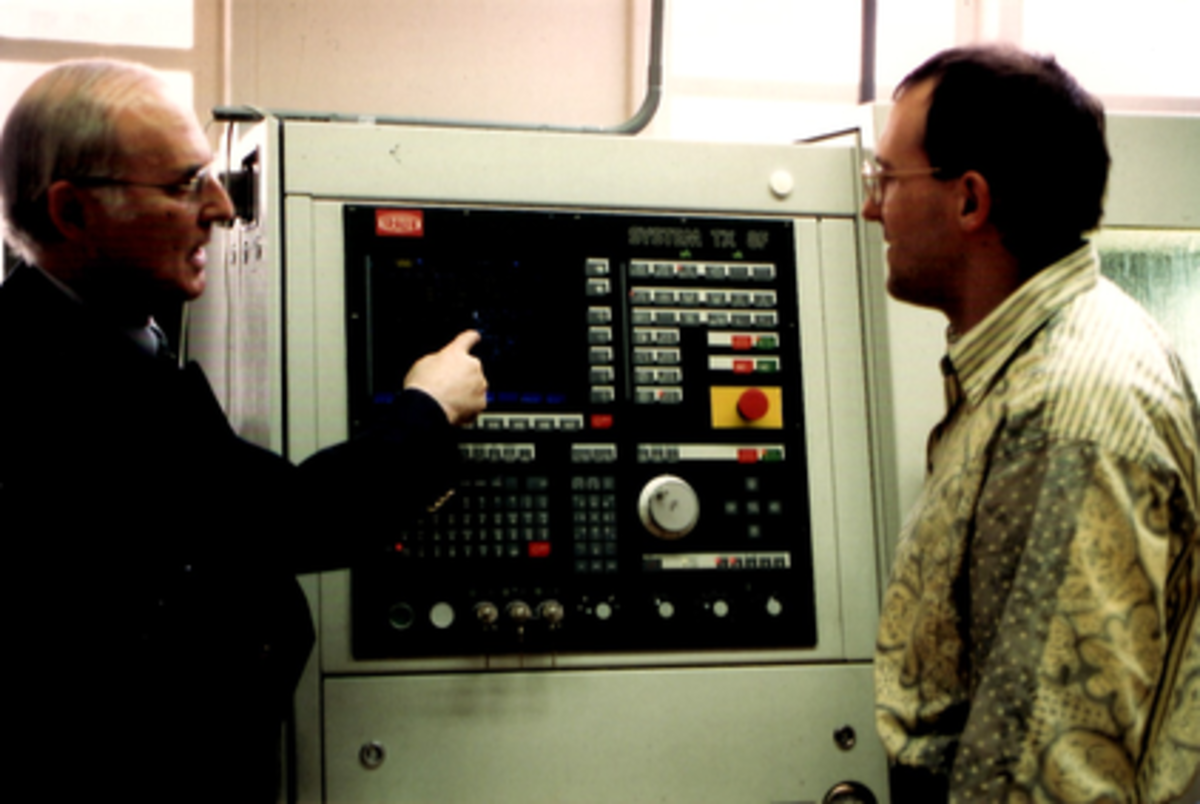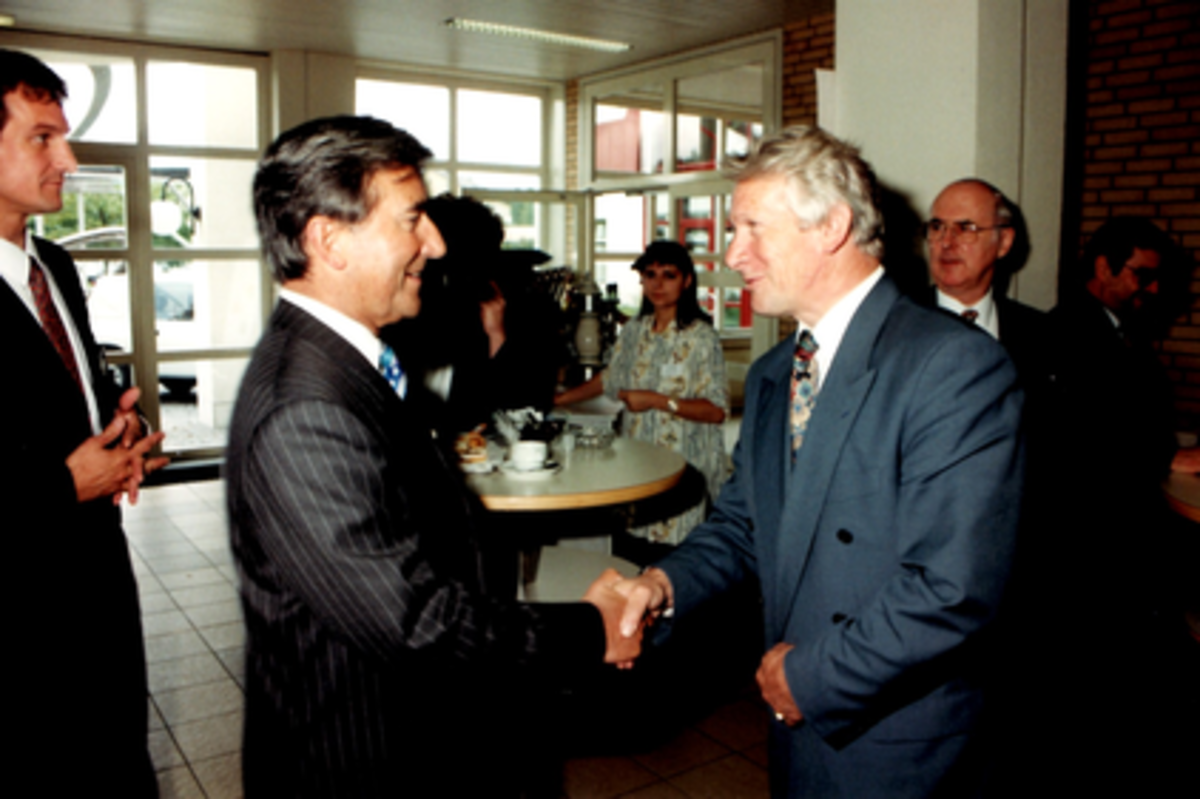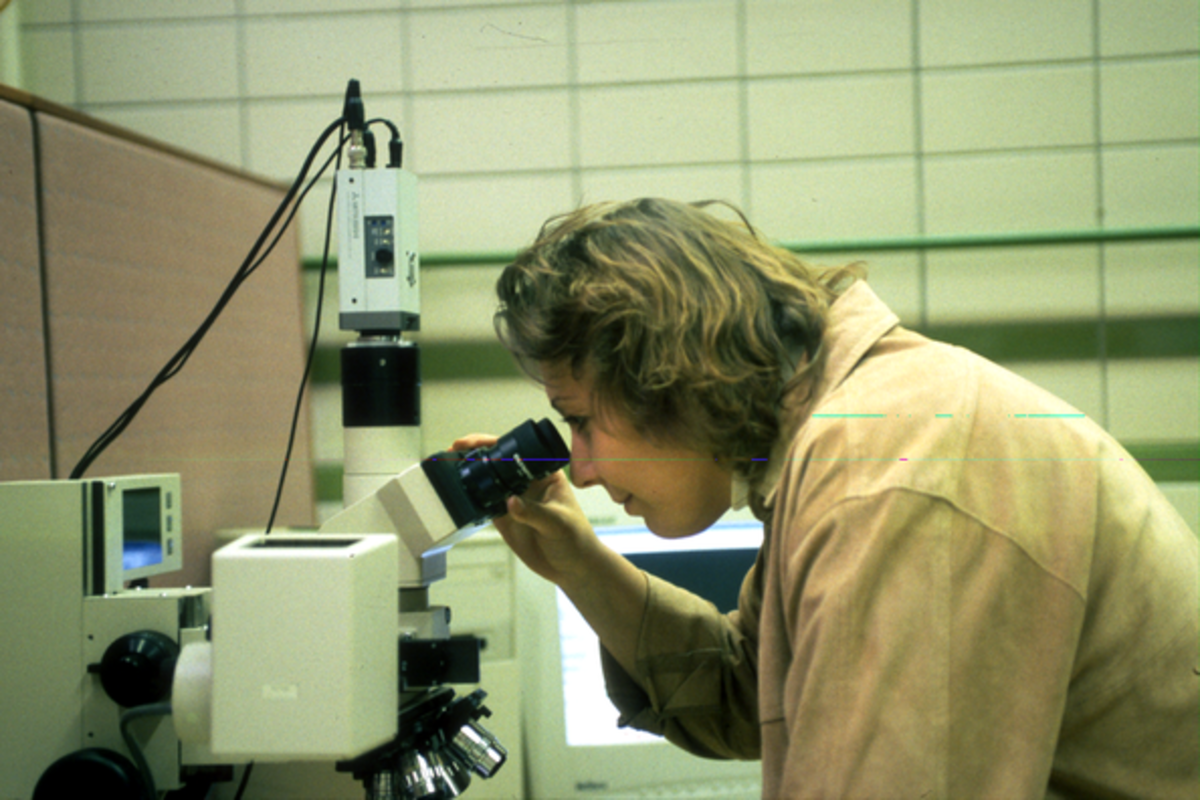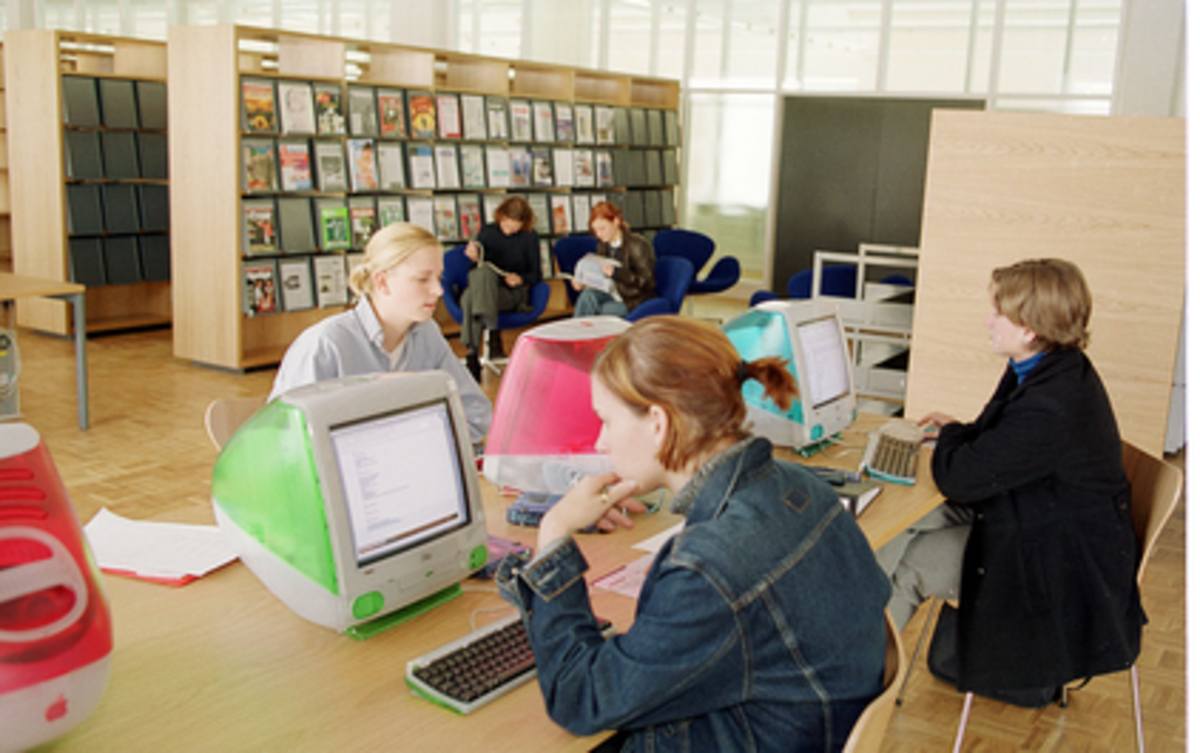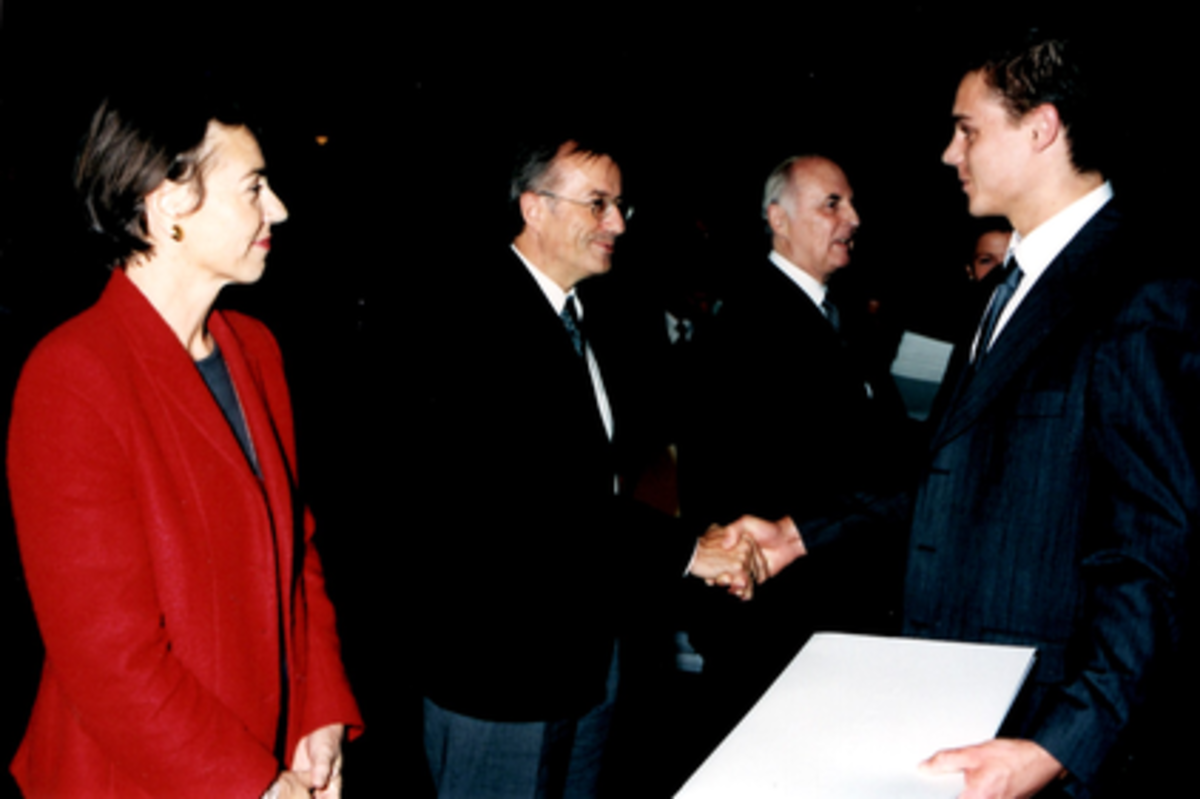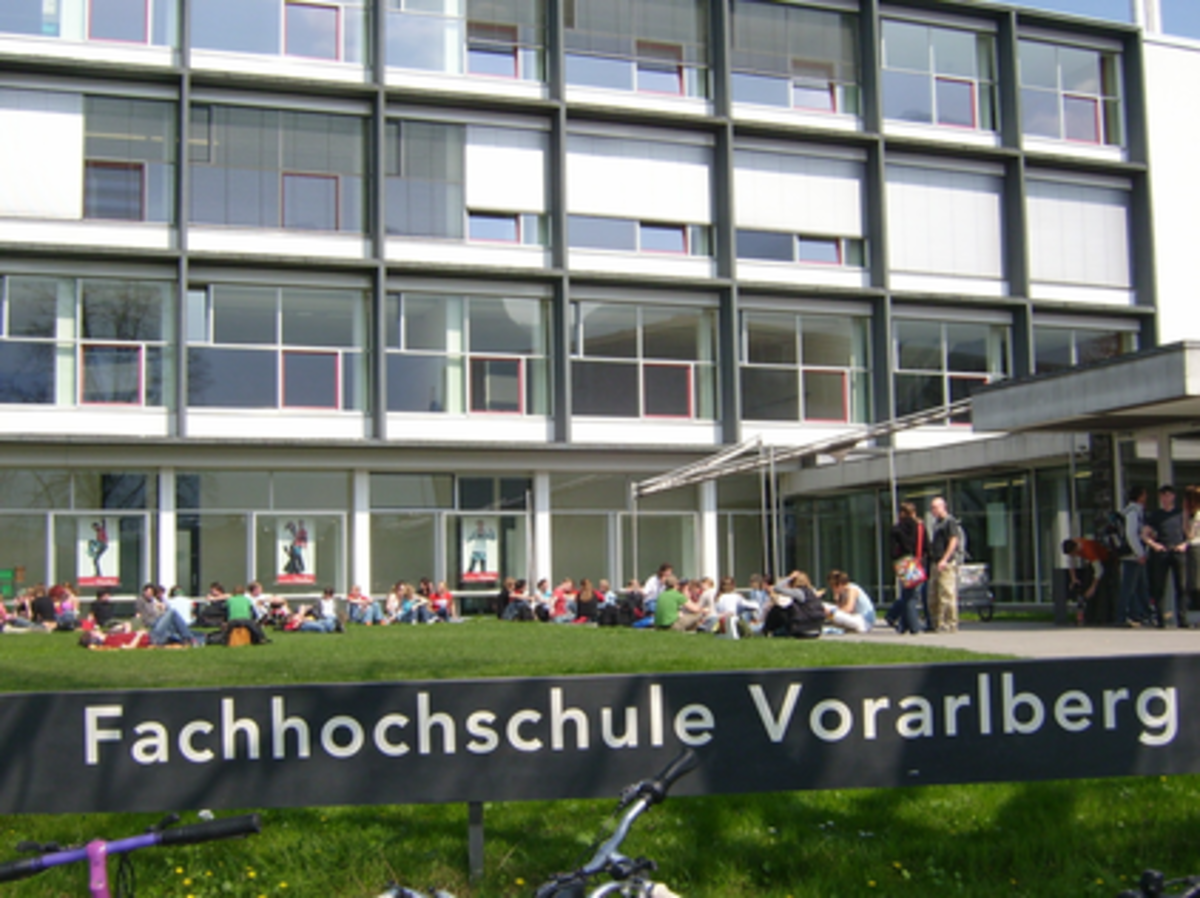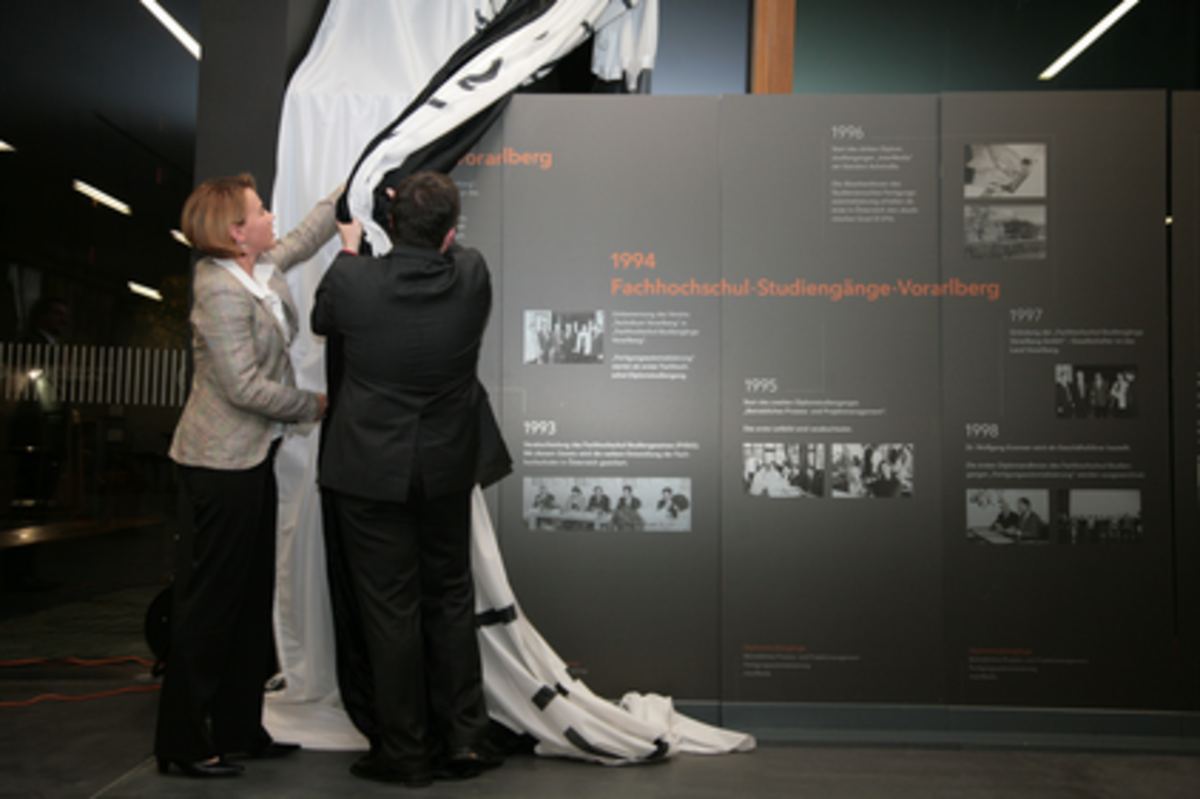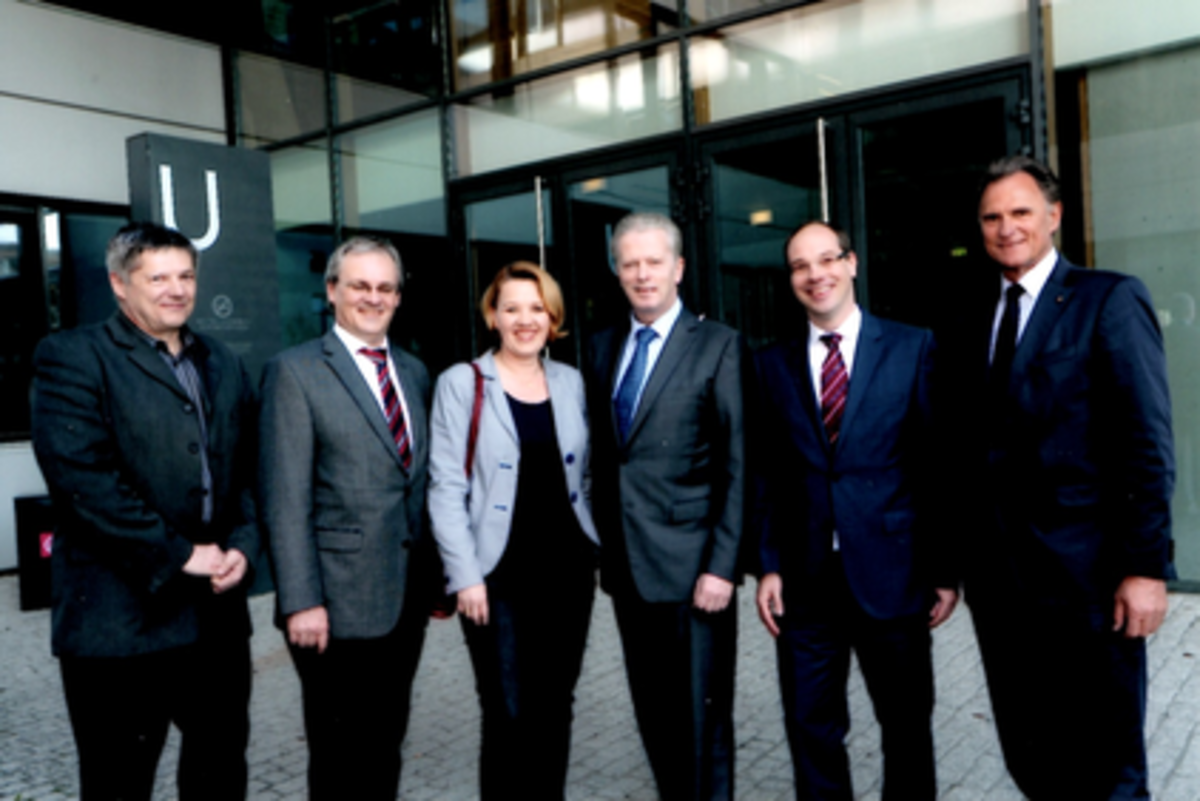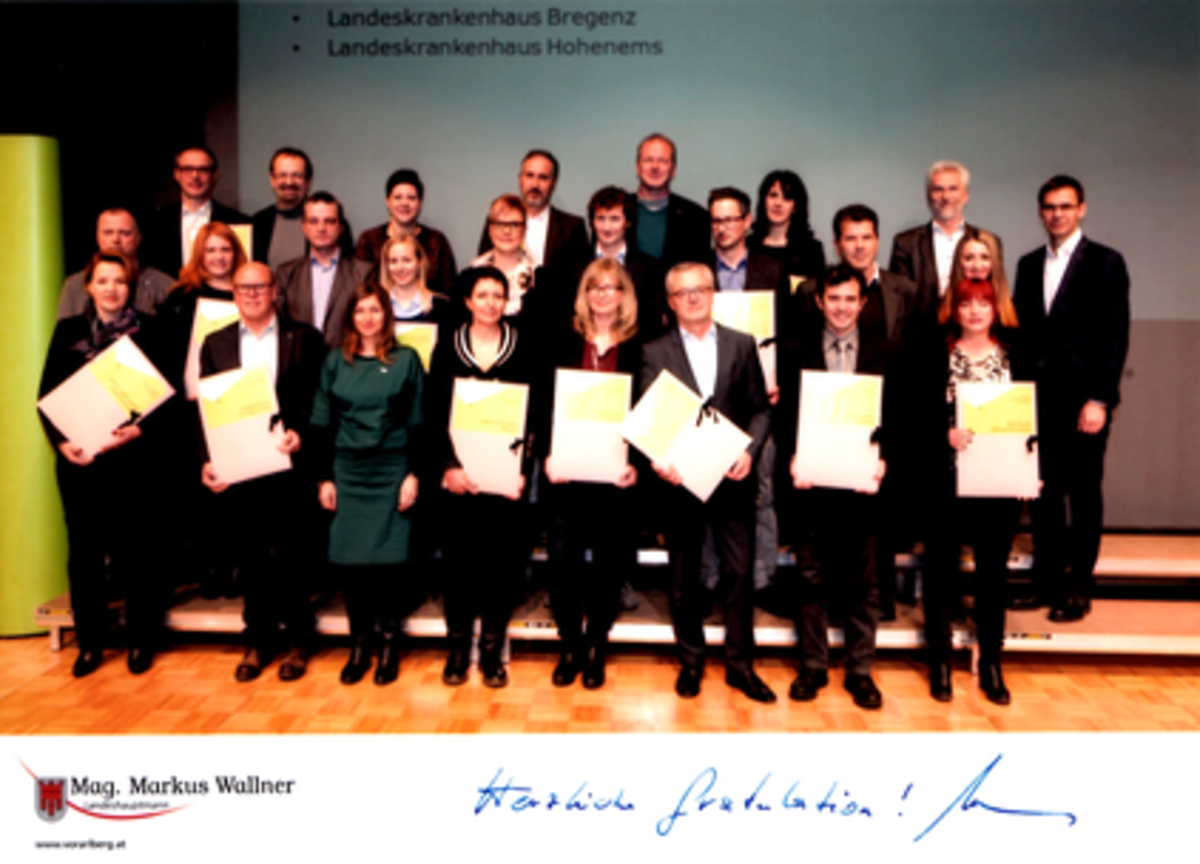History of the FHV
From an association to an internationally recognized university
This year the FHV celebrates its 30th anniversary. Founded in 1989 as the “Technikum Vorarlberg” association, the name was changed to “Fachhochschule-Studienprogramme Vorarlberg” in 1994 on the basis of the then newly passed Fachhochschulstudiengesetz. “At that time there was a visionary initiative that aimed to anchor and build internationally recognized higher education in the region,” explains Stefan Fitz-Rankl, FHV managing director, and adds: “This vision has been more than achieved.”
Learn, research and develop
Stefan Fitz-Rankl, FHV managing director, continues: "Looking back at the last three decades reveals an impressive development and numerous milestones that have made the FHV an internationally renowned university: For example, the continuous expansion of the study programs in the four departments Technology, Business, Design as well as Social Work and Health from just 56 students at the beginning to over 1,500 today, consistent internationalization since 1997, the gradual establishment of research centers and groups, and the start of cooperation with the 'Strong Partners' in 2014 , the founding of the European University in 2020 as part of the Regional University Network - European University (RUN-EU), to the structural expansions that will soon be completed.”
The history in more detail
2024
-
Election of Prof. (FH) Dipl.-Ing. Dr. techn. Regine Kadgien as rector
-
The Vorarlberg University of Applied Sciences celebrates its 30th anniversary. Around 7,000 graduates have completed their studies at FHV so far.
-
The RUN-EU General Assembly and Students Week are being held at FHV for the first time.
-
Establishment of Startup Vorarlberg GmbH with FHV participation (replacing the startupstube).
-
Opening of the new building: Section G – Cube.
-
Appointment of Birgit Schmid (Head of FHV Human Resources) as authorized signatory and Markus Preißinger (Head of FHV Research) as authorized signatory.
- Peter Kepplinger takes over the management of the “Energy” research center and the VKW illwerke endowed professorship.
- The first year of the part-time Master's in Sustainable Energy Systems will graduate in summer 2024.
- The FHV will benefit from a nationwide expansion of the university of applied sciences and 25 additional places for new students from the 2025/26 academic year for the part-time Bachelor's degree course in Social Work.
- Sandra Stroj, materials researcher at the Microtechnology Research Center and winner of the Christian Doppler Research Association prize, inspires future researchers as a role model in the children's book "Wer macht MI(N)T?".
- The Christl-und-Horst-Zimmermann-Förderpreis is awarded for the first time to specifically support students in the field of technology.
- The FHV once again receives the Ökoprofit recertification from the state of Vorarlberg. It has been taking part in the annual audit since 2017.
- FHV receives the "Excellent family-friendly company" seal of approval from the state of Vorarlberg for the fifth time.
2023
- German Design Award 2023 in the Excellent Communications category for the new corporate design of the FHV, developed by Zeughaus Design.
- Start of the health and nursing study program with an extended part-time model.
- Successful completion of the FHV recertification and auditing process with top grades (audit until 2030).
- Start of the Blended Learning Lab to support teachers in creating blended learning courses.
- Excellent results in the CHE university ranking 2023 for the bachelor's degree programmes "International Business Administration", "Social Work", "Industrial Engineering" and the master's degree programmes "Business Administration", "International Management and Leadership".
- Revision and publication of the criteria for a FHV professorship.
- Establishment of the Smart Engineering research group, start of three COIN projects (Cooperation & Innovation) and three cross-border innovation laboratories (Circular Lab, Mobility Lab, IoT & Sustainability Lab).
- Establishment of the Blum Endowed Professorship and the Digital Business Transformation research group.
- Third-party funding for research exceeds EUR 4 million for the first time.
- Dr. Armin Paul is retiring and handing over the management of Schloss Hofen, the continuing education center of the state of Vorarlberg and the FHV, to Dr. Peter Vogler.
- The first master's degree programme for post-graduation in behavioral therapy begins in Schloss Hofen, the curriculum for the first modular master's degree programme with an MSc (CE) degree in the field of "Psychosocial Counseling" is decided and the first university course "Fundamentals of Cable Car Management" is launched in cooperation with the Doppelmayr Group.
- Signing of several double degree programmes with partner universities within the framework of the European University RUN-EU
- Approval of the application for the institutionalization of the European University Alliance RUN-EU 2024-2026/2028 by the EU Commission.
- Reorganization of nostrifications (recognition of training achievements in third countries): The FHV as a central contact point is unique in Austria.
- Contract extension with Mag. Stefan Fitz-Rankl as managing director for another five years.
- Campus development progresses: renovation of the library premises.
2022
- Start of the new master’s degree programme in Business Informatics – Digital Transformation.
- Start of the legally obligatory special training or specialization in health care by FHV and Schloss Hofen called “Fundamentals of Child and Adolescent Care”.
- The FHV has been part of the European University “RUN-EU” since 2020. In 2022, the regionally oriented European university alliance expands to include two more universities.
- Signing of three new double degree programmes in the fields of Mechatronics (Master) and International Business Administration (Bachelor).
- Digital Factory Vorarlberg GmbH, a joint venture between FHV and AIT Austrian Institute of Technology, begins operations at the campus location.
- The FHV joins the Austrian Library Association and introduces the cloud-based library system ALMA.
- Appointment and election of the FHV Supervisory Board for the 6th term of office.
- Completion, release and adoption of the FHV strategy for the period 2023 to 2028.
- Top results in the “CHE Ranking 2022” for the Mechatronics and Electrical Engineering dual study programmes.
- New Blum Endowed Professorship for “Digital Business Transformation” is established.
2021
- Start of new bachelor’s programme „Environment and Technology“.
- Government order to increase bachelor’s programme "Healthcare and Nursing" from 90 to 120 ab initio places by 2023/24.
- Setting up a „TELL-Centers“ Teaching Excellence and Lifelong Learning Centre) at the college in order to strengthen and further develop teaching, quality and innovation in learning.
- Start of legally regulated specialist training or specialisations in care, led by FH Vorarlberg with its further education subsidiary Schloss Hofen in the areas of "Management duties in healthcare and nursing" and "Basic and mid-level care management".
- Founding of the Digital Factory Vorarlberg GmbH as a cooperation between FH Vorarlberg and the Austrian Institute of Technology (AIT) at the Dornbirn campus with a 49% participation on the part of FH Vorarlberg.
- Opening of the Josef Ressel Centre for Robust Decisions.
- FH Vorarlberg has been a „European University“ with a network of seven European universities with a regional focus [Regional University Network ("RUN-EU")] since 2020. The "RUN-EU+" follow-up project, which focuses on developing and introducing collaborative, practical and research-based programmes of study, launches in 2021.
- Founding member of the "Federation of Sustainable Universities"/"Bündnis nachhaltiger Hochschulen" (an initiative of the Austrian HE sector).
- Founding member of the “CampusVäre” association for invigorating and using the Campus V as a central location for innovation, education, research and science.
- Accession to the "European grouping of territorial cooperation (EGTC) - Academic Grouping of the Four Lake Constance Countries".
- Excellent results in "CHE Ranking 2021" for the "Healthcare and Nursing" and "Information Technology" study programmes.
- Thanks to its strength in research and focus on practical applications, the university makes it into the Top 25 Performers out of around 2,000 universities in the category "Co-publications with companies" in the international university ranking "U-Multiranking 2021".
2020
- Nomination of FH Vorarlberg as “European University” in cooperation with seven regionally oriented, European universities.
- Start of the cooperative doctorate and PhD programmes together with the University of Innsbruck. The dissertations offered by FH Vorarlberg are not exclusively aimed at the University of Innsbruck, but can be linked with many partner universities of FH Vorarlberg.
- Change in the name and profile of the master study programme “Energy Technology and Energy Economy” to “Sustainable Energy Systems.”
- By implementing the bachelor study programme “Health and Nursing Care,” FH Vorarlberg assumes the obligation to recognise bachelor degrees from the departments of the state government.
- Start of the new Josef Ressel Centre for “Smart Thermic Energy Systems” in the Energy research centre at FH Vorarlberg.
- Change in the name and focus of the research centre “Process and Product Engineering” to “Business Informatics.”
- Continuation of the research centre “Social and Economic Sciences” as the research group “Empirical Social Sciences.”
- Selection of the FH Vorarlberg teaching board (representation for heads of study as well as teaching and research personnel) for the next term of four years.
- Reappointment of Prof. (FH) Dr Dipl. Psych. Tanja Eiselen as Head of the Teaching Board for the next term of four years.
2019
- Start of the new bachelor study programme Computer Science - Digital Innovation
- Government mandate for the gradual expansion of the bachelor study programme “Health and Nursing Care to 90 beginner places by 2021
- Government mandate for the coordination of the future special training programmes and specialisations in care in Vorarlberg
- Successful completion of the discontinuing Josef Ressel Centre for “Applied Computational Science in Energy, Finance and Logistics”
- Approval from the Christian Doppler Research Association (CDG) for the establishment of a new Josef Ressel Centre for “Smart Thermic Energy Systems” in the Energy research centre
- Establishment of an ethics commission for the ethical assessment and evaluation of scientific investigations and research projects conducted on and with people
- Revision of the catalogue of criteria with guidelines for the allocation of professorship at FH Vorarlberg and establishment of a permanent review board for the assessment of proposals
- Prof. (FH) Dr Johanna M. Hefel, DAS, receives the Austrian Science Award for Social Work
- Top result in the 2019 CHE ranking for the bachelor study programme Electrical Engineering - Dual
- On its 25th anniversary, FH Vorarlberg can look back on a successful quarter of a century. The university has meanwhile educated around 5,500 specialists, established six research centres and offers over 300 employees an exciting place to work.
2018
- Start of the new Master's degree programme in International Management and Leadership
- 100th session of the University Council of the Vorarlberg University of Applied Sciences
- Start of the new Bachelor's degree programme in Health Care and Nursing
- Opening of the "Digital Factory Vorarlberg" as the 6th research centre of the Vorarlberg University of Applied Sciences
- Government decision on the expansion of the Vorarlberg University of Applied Sciences with three construction and renovation stages up to 2024 (top-up, extension, renovation)
- Participation of the Vorarlberg University of Applied Sciences in the sponsorship of an innovation hub on Campus V
- Implementation and conclusion of the strategy review 2018 to 2025 for all departments of the Vorarlberg University of Applied Sciences
- Top results in the CHE-Ranking 2018 for the Bachelor's degree programme "Computer Science – Software and Information Engineering"
- Award of the "Erwin Gächter Sponsorship Prize" to students of the University of Applied Sciences who have an exceptional curriculum vitae and perform very well
- Election of the Rector of the University of Applied Sciences Prof.in (FH) Dr.in Tanja Eiselen to the Presidium of the Association of Austrian Universities of Applied Sciences
2017
- The new bachelor’s programme Mechatronics (extra-vocational) starts.
- A new range of specialisations and optional modules is offered in the master’s programmes of the Vorarlberg University of Applied Sciences in connection with ‘Context Studies’.
- The ‘Starke Partner’ network grows to eight cooperation partners.
- The ‘startupstube’ start-up hub opens which acts as a centre for entrepreneurs, bringing together students from a wide range of disciplines and supporting them during the start-up process.
- The election of the Supervisory Board for the fifth term of office takes place; President of the State Parliament Mag. Sonderegger is re-appointed as Chair of the Supervisory Board.
- Certification as an ‘ECOPROFIT Organisation’ is awarded.
- The Vorarlberg University of Applied Sciences receives the Erasmus+ Award for the second consecutive year.
- Top results are achieved in the 2017 CHE Ranking for the degree programmes Industrial Engineering, Social Work and International Business.
- Certification as a ‘Family-Friendly University’ is awarded once again.
2016
- Prof (FH) Dr Dipl. Psych. Tanja Eiselen becomes Rector of the Vorarlberg University of Applied Sciences and assumes management of the college.
- The complete revision of the degree programmes Industrial Engineering, Mechatronics and InterMedia is successfully completed and starts in the 2016/2017 winter semester.
- The ‘Effective Management’ course begins at the Vorarlberg University of Applied Sciences and Schloss Hofen.
- The Vorarlberg University of Applied Sciences receives a project contract from the State of Vorarlberg to establish a bachelor’s degree programme in Health and Nursing Care with health and nursing care schools in Vorarlberg.
- An extra-vocational bachelor’s degree programme in Mechatronics is successfully accredited (starts in the 2017/2018 winter semester).
- The endowed professorship ‘Energy Efficiency’ is extended and expanded with VKW.
- The ‘Josef Ressel Centre for Applied Computational Science in Energy, Finance and Logistics’ successfully undergoes an interim evaluation.
- A memorandum of understanding with the University of Innsbruck is signed for greater cooperation in the areas of research, studies and further education.
- The certification and auditing process of the Vorarlberg University of Applied Sciences is successfully completed without any reservations whatsoever (of the seven test areas, four were assessed as ‘very good’ and three as ‘good’).
- The ‘Excellent Family-Friendly Enterprise’ award of the State of Vorarlberg and third place in the state award ‘Companies for Families’ are bestowed for particularly excellent achievements in the area of family-friendly personnel policy.
- Vorarlberg University of Applied Sciences wins the Erasmus+ Award 2016 for supporting the learning mobility of students and employees in the spirit of Erasmus.
- Dr. habil. Dana Seyringer, PhD, employee of the Research Centre for Microtechnology, is awarded the Vorarlberg Science Prize 2016.
2015
- With more than 1200 students, FH Vorarlberg achieves its expansion target for 2015.
- The strategy for FH Vorarlberg for 2016 to 2022 is adopted by the Supervisory Board.
- Launch of the extended part-time Bachelor's degree programme in "Social Sciences".
- Complete overhaul of the "International Business Administration" Bachelor degree programme concluded and launched in the WS 2015/2016.
- Creation of an exceptional internationalisation programme for part-time students.
- First preparatory course/study competence course jointly between FH Vorarlberg and Schloss Hofen.
- Opening of the "Josef Ressel Centre for Applied Scientific Computing in Energy, Finance and Logistics".
- First realisation of the cross-mentoring programme together with the Vorarlberg State Administration.
- Merger between the campus areas on both sides of the Dornbirner Ache under a single umbrella brand "Campus V".
- International CHE ranking assesses the "Computer Sciences" degree programme among the top in its class.
- Prof. (FH) Dr. Guido Kempter, Director of the research centre for user-centred technologies, receives a state award as a part of the Vorarlberg Research Awards.
2014
- Prof. (FH) Dr. Oskar Müller becomes Rector of FH Vorarlberg.
- Release of the newly revised University's Articles of Association and Bylaws.
- Launch of the "Electrical Engineering Dual" dual Bachelor's degree programme with 30 students; Revision of the "Computer Sciences - Software and Information Engineering" and "Social Sciences" Bachelor's degree programmes successfully completed.
- Approval of federal funding and successful accreditation of a part-time format for the "Social Sciences" Bachelor's degree programme.
- Opening of the Josef Ressel Centre Material Processing using ultrashort pulsed lasers.
- Start of the first FFG-COMET K-Project "LiTech- Easy to use professional business and system control applications" under the consortium leadership of FH Vorarlberg (UCT Research Centre).
- Establishment of the writing centre at the FH Vorarlberg Library to teach communication and writing skills.
- Establishment of the counselling centre to support students with disabilities or chronic diseases as the first university of applied sciences in Austria to do.
- Redesign of the FH Vorarlberg Alumni Association with more intensive contribution by FH Vorarlberg.
- "University and Family" certification for family-friendly institution and offers at FH Vorarlberg.
- First Green Meeting certification of the "check it out" event at FH Vorarlberg.
- The media platform "Ethify Yourself" wins the Austrian Environmental Education award.
- International CHE ranking assesses the degree programme "InterMedia" among the top.
- In the FORMAT rankings, FH Vorarlberg is listed as Austria's best university of applied sciences for the field of technology.
- Cooperation "FHV goes Inatura" with a series of events and workshops.
- Launch of the cooperation "Strong Partner" with select partners from industry within Vorarlberg.
- Anniversary celebration for 20 years of FH Vorarlberg.
- International Gaming Conference ISAGA with more than 300 participants from 34 countries.
2013
- Launch of the newly introduced "Energy Technology and Management" Master's degree programme in close collaboration with representative from the industry and energy research sector.
- Under the banner "COOPERATION WITHOUT BORDERS – Research in dialogue with society and industry", the research forum of Austrian Universities of Applied Sciences takes place at FH Vorarlberg for the first time.
- The FH Vorarlberg Library makes its 10,000th e-book available to users.
- 50 representatives of universities of applied sciences from America, South Korea, Mexico and all of Europe meet for three days for the Magellan Conference at FH Vorarlberg in Dornbirn to work together on developing the network.
- Implementation of a complete revision process for the degree programmes as a required aspect of the audit by AQ Austria.
- Conclusion of a cooperative agreement "Company-wide childcare at the Dornbirn CAMPUS" for FH Vorarlberg members (employees and students).
- The Mechatronics degree programme is ranked among top by the largest university of applied sciences ranking in German-speaking regions and is thus the assessed as the best Mechatronics programme of all universities of applied sciences in Austria.
- Redesign of the FH Vorarlberg Alumni Association. Together with the association, a significantly closer cooperation with FH Vorarlberg was agreed and resolved at the General Meeting on 29 October.
- Appointment of the seventh (interim) executive director: MMag. Stefanie Kuntschik.
- Appointment of the eighth executive director: Mag. Stefan Fitz-Rankl.
- Interim assumption of the Rector's office by Vice Rector Prof. (FH) Dr. Oskar Müller.
- Launch of the "Cable Cars - Engineering and Management" Master's degree programme at FH Vorarlberg and Schloss Hofen, in cooperation with Doppelmayr GmbH, Wolfurt.
2012
- Inauguration of the first endowed chair for "Energy Efficiency". The professorship in Energy efficiency sponsored by illwerke vkw presents an opportunity for close collaboration between local business in research and teaching in the field of energy.
- Expanded options in the Mechatronics degree programming with new majors in "Electrical Engineering/Electronics" and "Mechanical Engineering".
- Amendment to the FHStG: Re-organisation of the college.
- 1000th guest student welcomed to FH Vorarlberg. Since the beginning of the student exchange programme in 1997, 1000 young students from a total of 32 countries have taken advantage of this opportunity.
- The "Computer Sciences - Software and Information Engineering" Bachelor degree programme is ranked among top by the largest university of applied sciences ranking in German-speaking regions in all categories and thus achieves first place in Austria and a top spot internationally.
- The uDay (Usability Day) celebrates its 10th anniversary. The symposium focuses on the interaction between man and technology and features pioneering ideas in the field.
- With the merger of the FHV-Kinderuni ("Children's University") and the Kindermusikuni ("Children's Music University") of the Vorarlberg Academy of Music, the Vorarlberg Kinderuni for children aged 8-12 was launched. The Jugenduni ("Youth University") programme for youth aged 12-16 is also offered.
2011
- Introduction of the new continuing education programmes in "Social Management" and "EUREM I – Seminars for the Lake Constance Region".
- International CHE ranking places the Business Engineering degree programme in the top 100 WING degree programmes.
- In a ranking of job opportunities, Austrian human resources managers select the part-time Master's programme "MNT: Micro- and Nanotechnology" as number one.
- Establishment of a doctoral programme as an internal course for training FH Vorarlberg doctoral students. Three FH Vorarlberg employees graduate with "Very good" distinction, of which two from the Process and Product Engineering Research Centre (FZ-PPE) who were supervised by qualified FH Vorarlberg lecturers, and one from the Department for Social and Organisational Sciences (SoWi).
- Establishment of the advisory boards in the Economics, Technology and Design divisions. An advisory board in the Social Work division has been in existence already for one year.
- Receipt of the "Life Long Learning Award" for high quality in planning and implementing student mobility in the Erasmus programme; at the same time, distinction as a Sieger project.
- Awarding of an outstanding achievement award by Federal Minister Dr. Karlheinz Töchterle to two graduating students. Already for the fifth time in eight years, FH Vorarlberggraduates have received the "Outstanding Achievement Award of the Federal Ministry for Science and Research".
- Awarding of the ECTS label by the European Commission for excellent implementation of the ECTS system. At present there are only 41 universities of applied science in all of Europe with this distinction. In Austria, this includes MCI, FH BFI Vienna and now also FH Vorarlberg.
- Appointment of the fourth Rector: Prof. Dr.-Ing. Lars Frormann.
2010
- Start of the part-time Master’s degree "Social work ".
- Further education: start of part-time further educational program "video journalism and video design for TV, online and PR" (University style course).
- Introduction of the part-time Master's degree programme in Social Science.
- Introduction of the part-time continuing education programme "Video Journalism and Design for TV, Online and PR".
- Establishment of the "Social and Economic Sciences (FB SoWi)" and "Mechatronics (FB Mechatronics)" fields of study.
- Evaluation of FH Vorarlberg as an Outstanding Institution by a FHR review team.
- International CHE ranking assesses the Mechatronics degree programme as a leader among the ten best universities of applied sciences.
- Evaluation of the Josef Ressel Centre as Outstanding by the Federal Ministry for Science and Research.
- At total of 389 first-year students (261 in Bachelor's degree programmes and 128 in Master's degree programmes) begin studies at FH Vorarlberg; 344 graduates successfully complete their programmes.
- For the first time 25 part-time students take part in the Internationalisation programme and are involved in a Short Team Exchange Programme (STEP) in India.
- The target for 2010 to 2015 (with a catalogue of measures) based on the FH Vorarlberg strategy document prepared in 2009 was approved by the Supervisory Board. In addition, the board resolved the organisation statute, in which the internal structure, organisation and collaboration of the institutional management is defined and described.
- The Management Handbook with a process map was approved.
- The European Commission awards "Diploma Supplement Labels" for exemplary implementation of the provisions of the Bologna Process.
2009
- Successful re-accreditation of the Bachelor degrees "Mechatronics", "Engineering", "IT" (new title: "IT software and Information Engineering"), "Business studies" full-time and part-time (new title: "International business studies full-time and part-time"), "Media and design" (new title: "InterMedia").
- The first 92 Master’s graduates successfully complete their course with the academic title "Master of Science in Engineering, MSc", "Master of Arts in Business, MA" and "Master of Arts in Arts and Design, MA".
- Student mobility: the University has cooperation agreements with 114 Universities in 24 European countries and also in North, Central and South America, Asia, Africa and Australia.
- Further education: start of the part-time further education program "Location and regional management" (University-style course).
- Completion of the strategy 2009-2015.
- Refocusing the direction based on the strategy 2009-2015.
- Set up of Josef Ressel-centre.
- Anniversaries: 20 years Vorarlberg technical Association; 15 years university degree courses; 10 years FH Vorarlberg
- First award of the "Blum-Prize" and "Hilti-promotion prize".
- "Lifelong Learning Award"
2008
- The further education department along with the further education programs NDS/MBA-Program are spun off and relocated to Schloss Hofen.
- The first 173 bachelor graduates successfully complete their course with the academic title "Bachelor of Science in Engineering, BSc", "Bachelor of Arts in Business, BA" and "Bachelor of Arts in Arts and Design, BA".
- 15 November 2008 the number of students exceeds the 1000 mark for the first time. There are exactly one thousand female students (40%) and male students (60%) at the FH Vorarlberg.
- Start of a further extensive strategy development process for the next decade.
- "LifeLongLearning Award" for the high quality in planning and implementation of student mobility in the Erasmus program.
- Appointment of the sixth managing director: Dr. Hedwig Natter.
- Re-election of the Rector: Prof. (FH) DI Rudi Feurstein.
2007
- Adapting the degree course in Social work to the Bachelor and Master's structure.
- Start of the Master’s courses in "Mechatronics", "Business studies, part-time", "InterMedia part-time" and "IT".
- Start of the Master’s modular library.
- 10 years after the introduction of student mobility 93 students are studying for a semester at a partner university abroad and 102 exchange students are doing their semester abroad at the FH Vorarlberg.
- The German language PBL-Congress is held at the FH Vorarlberg.
- Award "Federal Ministry of education, science and culture, award of honour"
- Award "E-Quality Label".
2006
- Schloss Hofen becomes 100% subsidiary of the University.
- Award "Federal Ministry of education, science and culture, award of honour"
- Award "Sokrates quality seal".
- Appointment of fifth Managing Director: Dr. Vaheh Khachatouri.
2005
- Construction completion at Campus Vorarlberg, building extension of the University. Location: Hochschulstraße.
- Start of University for children Vorarlberg.
- Second research report "summary0506" is published.
- Award "ECTS-Label" and "Sokrates quality seal".
- Award "Diploma Supplement Label".
- Appointment of third Rector: Prof. (FH) DI Rudi Feurstein.
2004
- Adaptation of degree programmes to Bologna conforming Bachelor and Master's degrees (exception: social work). Thus the Bachelor degrees in Mechatronics, Business and Commerce full-time, Business studies full-time, Business studies, part-time, Media and design and IT start for the first time.
- Start of the new part-time Bachelor course "Engineering".
- Introduction of the foreign language plan with extended language courses on offer.
- Further education: start of transborder, part-time further education and Master's program (University style course) "Micro- and Nanotechnology".
- Set up of three research centres "micro-electronics (FZ-MT) ", "user centred technologies (FZ-UCT)" and "Product and process engineering (FZ-PPE) ".
- Conversion of "Fachhochschule Vorarlberg Forschung GmbH" to the child-centre "VResearch". The University has a 49% stake in this.
- Set up of "Micro-and nano technology network EUREGIO Lake Constance".
- The first research report "summary0304" is published.
- Introduction of strategic targets in connection with staff appraisals and target agreements.
- Start of the lecture series Start "Being an entrepreneur today" and "Getting a grip on product development".
- Set up of the Association "JUMP - Joint University Mobility Platform" to support the promotion of student mobility.
- First award of the "Socrates quality seal".
- Award "Federal Ministry of education, science and culture, award of honour"
- Award "Goldene Nica" at Ars Electronica.
2003
- Completion of strategy 2003 "The University of Applied Science in Vorarlberg - the path taken by the University farm a special Austrian solution into European scientific region". Comprehensive, strategic refocusing in both teaching and research under the auspices of a concept until 2007. Introduction of personnel development plan.
- Remodelling of direction based on the 2003 strategy.
- Extensive funding from the EFRE- and FHplus-programs.
- Held first "uDay" and "microtechnology days" under the auspices of "Vorarlberg university days“.
- Award " Austrian state ties for multimedia and e-business“.
2002
- Start of the 6th course "Social Work".
- Set up of "Fachhochschule Vorarlberg Forschung GmbH".
- Election of second Rector: Prof. (FH) Dr. Oskar Müller.
2001
- Start of the fifth degree course "International Business Administration“, part-time. This is the first time an part-time degree course is on offer.
- Further education: start of the extra occupational NDS/MBA-Programme "IM - International Management" in cooperation with the University of Applied Science in Liechtenstein. This start of the part-time course with University character "IT-network management".
- The new R and D committee set up by the Council produces an R and D plan, defines processes and assessment criteria and documents projects.
- The University of Applied Science joins University of Applied Science Corporation, Constance University of Applied Science (IBH).
- Introduction of TQM based on EFQM.
- The fourth Managing Director is appointed: Mag. Kurt Koleznik.
2000
- Start of the fourth degree course "iTec - Information and Communication Engineering".
- Further education section: start of the first part-time further training and Master’s program (course of University standard) "IPD - Integrated Product Development“.
1999
- University of Applied Science status is granted and the University is named "Fachhochschule Vorarlberg GmbH".
- The first 40 graduates complete the degree course "Business process and project management (BPPM)" and are awarded the academic title “Mag. (FH)".
- Comprehensive organisational development: Profiles of degree courses and knowledge pool (formerly specialist departments) are sharpened up: International Office is set up.
Assessment procedure is further developed. Set up of the ALUMNI-graduate Association. - Library is opened.
- “newway award“ given for the first time.
- Election of the first Applied Science University Council.
- Appointment of first Rector: Dr.-Ing. Guntram Feurstein.
1998
- Set up of Equal Opportunities Office.
- The first 24 graduates successfully complete the applied science University degree course "production automation" and are awarded the academic title "Dipl.-Ing. (FH)".
- The third Managing Director is appointed: Dr. Wolfgang Kremser.
1997
- Set up of "Applied Science University courses Vorarlberg GmbH“, owner federal-state Vorarlberg.
- Start of student mobility: for the first time 14 students spend a semester abroad; two guest students from abroad study in Vorarlberg.
1996
- Start of second degree course "Business process and project management (BPPM)"
- The first departments "Technology", "Business“, "Industrial methods" and "IT“ are set up.
- The first overall concept is agreed.
- Entry procedure is developed.
1995
- Start of second degree course "Business process and project management (BPPM)"
- The first departments "Technology", "Business“, "Industrial methods" and "IT“ are set up.
- The first overall concept is agreed.
- Entry procedure is developed.
1994
- Name change from "Technical school, Vorarlberg" to "University of Applied Science degree courses, Vorarlberg".
- "Aautomated Production" starts as University degree course with 45 students. Staff number: 10
1993
- The University of Applied Science degree course law is passed. This guarantees the further development of Applied Science Universities in Austria.
1992
-
Start of the 'Applied Science University degree pilot course in Automated Production' together with the technical University in Graz. Location: Höchsterstraße.
1989
- Set up of the group "Technical school, Vorarlberg". Dornbirn thus becomes the cradle of Austrian Applied Science Universities.
- Senior education adviser OStR Prof. DI Paul Ulmer is appointed as first Managing Director and director. He is succeeded by Markus Linhart as Managing Director.
